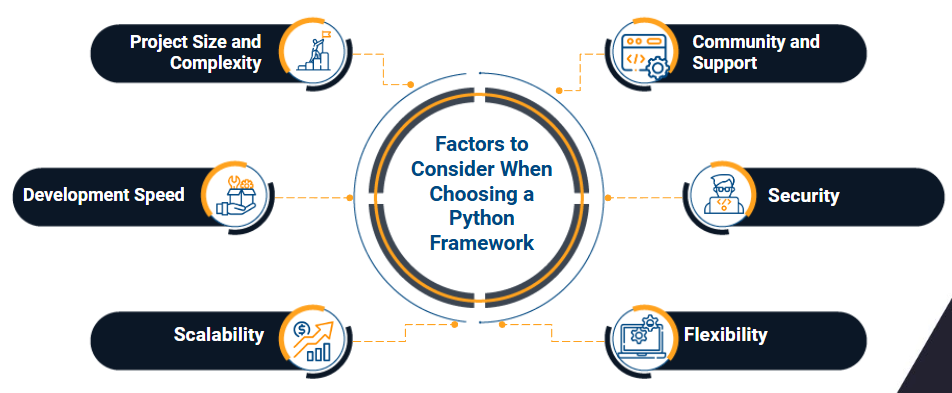Selecting the right technology stack is essential for the success of any software project. Python, with its ease of use and robust capabilities, has become a preferred language for web development. However, the variety of Python frameworks available can make it challenging for business leaders to choose the most suitable one for their needs. This article aims to provide clear guidance on selecting the ideal Python framework to ensure your software development project is efficient, scalable, and successful.
Understanding Python Frameworks
Python frameworks are pre-built collections of libraries and modules that provide developers with a foundation to build web applications. They offer essential features such as database interaction, URL routing, and HTML templating, reducing the amount of code developers need to write from scratch. Python frameworks can be broadly categorized into full-stack frameworks and micro-frameworks.

Full-Stack Frameworks
Full-stack frameworks provide a comprehensive solution, including everything needed to build large-scale applications. They come with built-in features like ORM (Object Relational Mapping), form validation, and authentication.
- Django: Django is one of the most popular full-stack Python frameworks. Known for its "batteries-included" philosophy, Django comes with a plethora of built-in features that simplify the development process. It’s ideal for complex, data-driven websites and applications. Django’s robustness, scalability, and security make it a top choice for large enterprises.
- Pyramid: Pyramid is a highly flexible and modular full-stack framework. It is designed to start small and scale up to complex applications. Pyramid’s flexibility allows developers to use only the components they need, making it a good choice for projects that require customization and scalability.
Micro-Frameworks
Micro-frameworks are lightweight and provide the essential components needed to build web applications. They are minimalistic and allow developers to add only the functionalities they require, making them ideal for smaller projects or services that need to remain lightweight.
- Flask: Flask is a micro-framework that is simple, flexible, and easy to use. It doesn’t come with built-in components like ORM or form validation, allowing developers to choose the libraries and tools that best suit their project. Flask is perfect for small to medium-sized applications and APIs.
- Bottle: Bottle is another micro-framework that is extremely lightweight and easy to use. It is ideal for small applications, rapid prototyping, and educational purposes. Despite its simplicity, Bottle is powerful enough to handle essential tasks like routing, templating, and request handling.

Factors to Consider When Choosing a Python Framework
When selecting a Python framework for your software project, several factors should be taken into account to ensure the framework aligns with your business needs and project goals.
1. Project Size and Complexity
The size and complexity of your project are crucial determinants in choosing a framework. Full-stack frameworks like Django and Pyramid are well-suited for large, complex applications with extensive feature requirements. In contrast, micro-frameworks like Flask and Bottle are ideal for smaller projects or applications that require a high degree of flexibility and customization.
2. Development Speed
Time-to-market is often a critical factor for business leaders. If you need to develop and deploy your application quickly, a full-stack framework like Django, which comes with many built-in features, can significantly speed up the development process. Conversely, if your project allows for a more gradual development pace with iterative improvements, a micro-framework like Flask might be more appropriate.
3. Scalability
Your chosen framework should support the scalability requirements of your project. Full-stack frameworks are typically better suited for applications that anticipate high traffic and complex data interactions. However, micro-frameworks can also scale effectively with the right architectural design and additional tools.

4. Community and Support
A vibrant community and strong support are essential for any technology stack. Frameworks like Django and Flask have large, active communities, extensive documentation, and numerous third-party plugins and extensions. This support can be invaluable when troubleshooting issues or seeking best practices.
5. Security
Security is paramount for any web application. Full-stack frameworks like Django come with built-in security features such as protection against SQL injection, cross-site scripting (XSS), and cross-site request forgery (CSRF). When using micro-frameworks, additional security measures may need to be implemented manually.
6. Flexibility
The degree of flexibility required for your project can influence your framework choice. Micro-frameworks offer greater flexibility by allowing you to pick and choose the components you need, which can be beneficial for projects with unique requirements. Full-stack frameworks, while less flexible, provide a more structured and comprehensive development environment.

Choosing the right Python framework for your web development project is a critical decision that can impact the overall success and efficiency of the development process. By considering factors such as project size, development speed, scalability, community support, security, and flexibility, business leaders can make informed decisions that align with their strategic goals.
A custom Python web development company can provide expert guidance and support throughout this decision-making process. With their deep understanding of various frameworks and industry best practices, they can help you select the most suitable framework for your project, ensuring that your application is robust, scalable, and aligned with your business objectives.
In conclusion, whether you opt for a full-stack framework like Django or a micro-framework like Flask, the key is to choose a framework that best meets your specific needs and project requirements. Partnering with a specialized Python development agency can further enhance your project’s success, providing you with the technical expertise and experience needed to build a high-quality web application.
We recommend you on video
